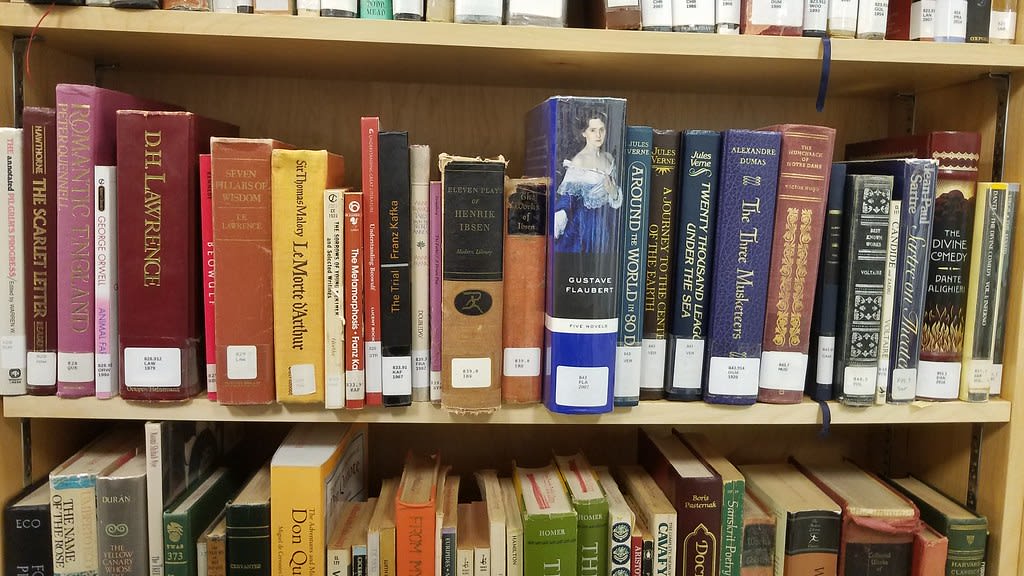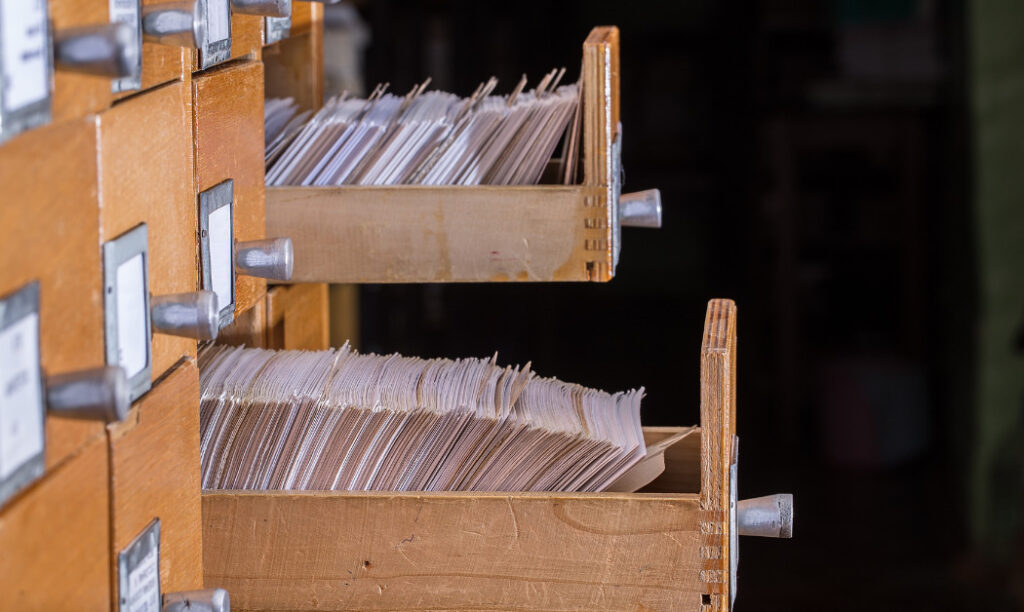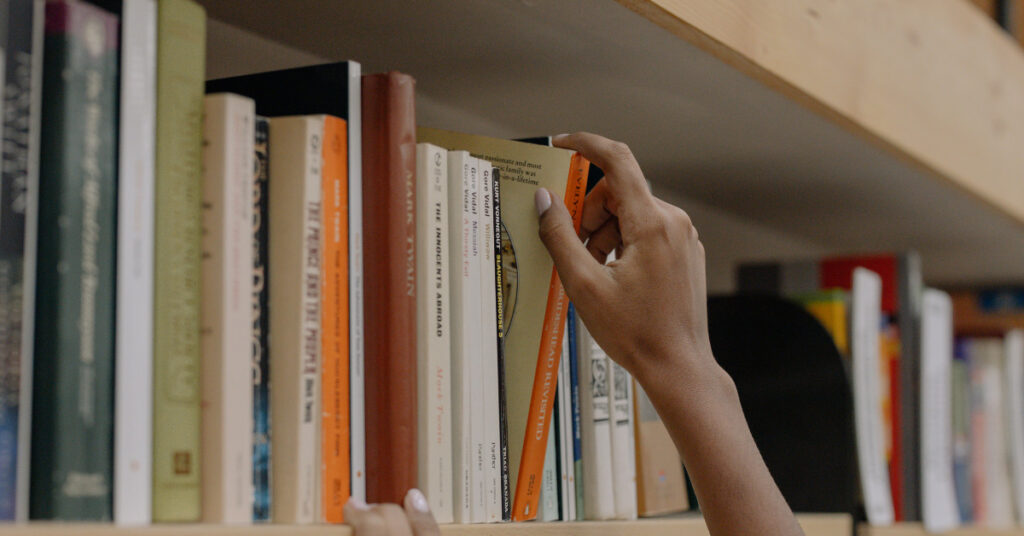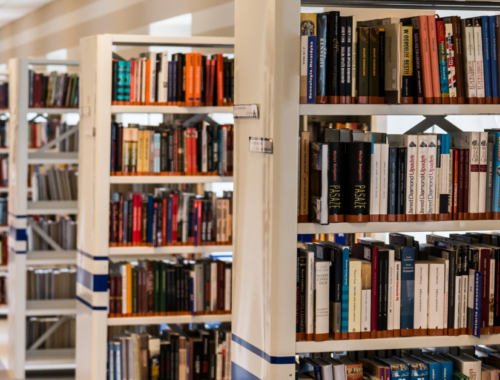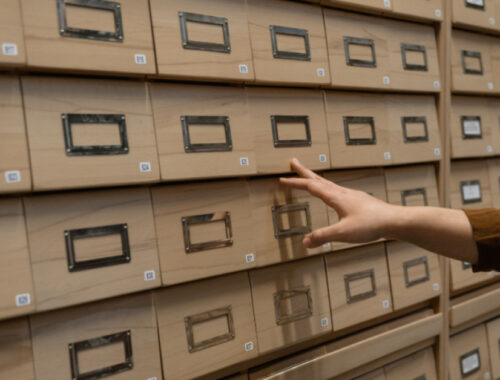
If you were a librarian, how would you organize the seemingly endless number of books under your care? One of the easiest ways to do so may be to arrange them alphabetically, but is that really helpful?
Using that system, a book titled Basic Human Biology may be next to Bob’s Big Adventure. The two books have nothing in common, and someone looking for books on human biology would have to know either the name of each book he’s looking for or blindly search each shelf to find other books on the same topic.
With that being said, a better system would be to organize books based on the topic, which is exactly what Melvil Dewey thought.
- What Is the Dewey Decimal System?
- Do Libraries Still Use the Dewey Decimal System?
- Exploring Alternatives to the Dewey Decimal Classification
- What’s the Future of Library Classification?
- Frequently Asked Questions
- What is the Dewey Decimal System used for?
- How does the Dewey Decimal System work in a library?
- Why do some libraries stop using the DDS?
- How can I do a Dewey Decimal System lookup?
- How does Dewey Decimal compare to the Library of Congress system?
- Can the DDS be expanded or modified?
- Where can I learn to navigate the DDS more easily?
- Will physical libraries even need classification systems in the future?
What Is the Dewey Decimal System?
The Dewey Decimal Classification is a standardized classification method used in libraries worldwide to organize books and resources efficiently. It is the most widely used library classification system, allowing libraries to categorize books based on subject matter and facilitate easy browsing for readers.
American librarian Melvil Dewey invented the Dewey Decimal System (DDC) in 1873 to be used in the Amherst College Library. His system was then published in 1876 and has since been adopted by over 135 countries.
Since then, the DDC has been continually revised to keep up with new knowledge.
Dewey Decimal System Classification
The Decimal System Classification (DDC) uses a classification method that organizes books based on ten primary categories. This method uses a series of numbers to identify each category. The ten primary categories are:
- 000—Computer Science, Information, and General Works
- 100—Philosophy and Psychology
- 200—Religion
- 300—Social Sciences
- 400—Language
- 500—Science
- 600—Technology
- 700—Arts and Recreation
- 800—Literature
- 900—History and Geography
In other words, if you want to find a book within the religion category, then you will look for books between 200 and 299.
But the system is much more robust than simply searching through all the books in the 200s.
Dewey Decimal Number Lookup — Examples
Each number refers to a certain category of topics. For example, if you want to find books on ethics, then you would first go to the 100 to 199 section. Books on ethics can be found between 170 and 179:
- 170—General
- 171—Systems and Doctrines
- 172—Political Ethics
- 173—Ethics of Family Relationships
- 174—Economic and Professional Ethics
- 175—Ethics of Recreation and Leisure
- 176—Ethics of Sex and Reproduction
- 177—Ethics of Social Relations
- 178—Ethics of Consumption
- 179—Other Ethical Norms
Believe it or not, the system can get even deeper. A decimal point is added after the first three numbers to further distinguish between categories.
For example, if you are looking for a book on the history of the U.S. Constitution, then you would first go to the History section (900s). The History of North America is found in the 970s with the History of the United States being in the 973s.
The History of the United States is further subdivided using a decimal point. In this case, the Constitutional period is located in 973.4s. The topic can be further subdivided with many books having two to three numbers after the decimal point.
While uncommon, evolving topics often lead to a series of numbers after the decimal point. For example, books on computer lawyers can be found in the 343.0999092s section.
As the world’s knowledge continues to advance, subsections will continue to evolve as more subcategories come to light.
Do Libraries Still Use the Dewey Decimal System?
In the digital age, you may wonder if the Dewey Decimal Classification is still widely used. The short answer is yes—many libraries worldwide rely on this system to organize their collections efficiently. Despite the rise of digital catalogs and alternative classification systems, the DDC remains the most commonly used method in public and school libraries.
The Dewey editorial office, located in the Library of Congress, actively maintains and updates the system. Editors propose revisions and expansions, which are then reviewed by an international board known as the Classification Editorial Policy Committee. These updates ensure that the classification system continues to evolve with new subjects and modern knowledge fields.
While librarians primarily use the Dewey Decimal Classification to categorize books, patrons do not need to memorize the system to find materials. Most libraries provide public computers and online catalogs, allowing users to search by title, author, subject, or ISBN to locate books easily.
There are also numerous online databases, like the ISBN database, that make searching for books a lot easier.
Librarians can also use these online databases to categorize the books under their care. Instead of manually coming up with each DDS number, librarians can look the book up using WebDewey —the electronic version of the DDS—to find the corresponding number.
This allows librarians worldwide to accurately label each book, allowing for a more unified system.
Exploring Alternatives to the DDC
While the Dewey Decimal Classification remains the dominant classification system in public and school libraries, some institutions have transitioned to alternative methods that they find more intuitive, user-friendly, or flexible.
Here’s a look at why some libraries are moving away from the Dewey Decimal Classification and what systems they are adopting.
Why Some Libraries Still Use the DDC
- Global Standardization: The Dewey Decimal Classification is recognized worldwide, allowing for consistency across different libraries.
- Efficient Book Organization: Despite criticisms, the Dewey Decimal Classification groups books logically, making it easier for librarians to maintain collections.
- Economic Considerations: Transitioning to a new system is expensive, requiring libraries to reclassify books, retrain staff, and update digital catalogs.
- Ongoing Updates: The system evolves to accommodate new subjects through periodic updates.
Why Some Libraries Are Moving Away from the DDC
- User-Friendliness: Some libraries believe the Dewey Decimal Classification is not intuitive for modern readers, as people prefer subject-based or genre-based browsing.
- Bias and Limitations: Critics argue that the Dewey Decimal Classification reflects outdated perspectives, particularly in its categorization of social sciences, religion, and LGBTQ+ topics.
- More Flexible Alternatives: Some alternative classification methods allow for easier browsing and are better suited to modern information needs.

Comparing the Dewey Decimal Classification to Alternative Systems
Many libraries explore classification models that they believe better serve their patrons. Here are some of the most notable alternatives:
1. Metis Classification (School Libraries)
- Designed specifically for school libraries.
- Uses kid-friendly terms instead of numeric codes.
- Encourages browsing based on student interests rather than strict categories.
- Works well for younger readers who may find the Dewey Decimal Classification too complex.
2. Universal Decimal Classification (UDC)
- More commonly used outside the U.S., particularly in European and international libraries.
- Based on the Dewey Decimal Classification but allows for more detailed classifications.
- Supports multiple languages, making it more adaptable globally.
3. Library of Congress Classification (LLC)
- Primarily used by academic and research libraries.
- Uses a combination of letters and numbers, making it more detailed and flexible than the Dewey Decimal Classification.
- Preferred for large collections and specialized research materials.
- Considered more adaptable than the Dewey Decimal Classification but less intuitive for general readers.
4. Book Industry Standards and Communications (BISAC)
- Used primarily in bookstores rather than libraries.
- Organizes books by subject rather than numeric classification.
- Easier for casual readers to browse, as it follows a real-world subject-based approach (e.g., “History” instead of “900s”).
- Some public libraries have transitioned to Book Industry Standards and Communications-style shelving to improve accessibility.

What’s the Future of Library Classification?
With digital catalogs and online search tools becoming the norm, libraries are rethinking classification systems. Some experts suggest that physical classification will become less critical, while others argue that a structured system is still necessary for managing collections effectively. As technology evolves, libraries may continue adapting the Dewey Decimal Classification or transitioning to more user-friendly classification methods.
Frequently Asked Questions
1. What is the Dewey Decimal System used for?
The Dewey Decimal System is used to categorize books in libraries so that similar topics are grouped together, making it easier for people to locate specific subjects.
2. How does the Dewey Decimal System work in a library?
Each book is assigned a numerical classification based on its subject. Books are then shelved in numerical order, starting from general knowledge (000s) to more specialized topics like literature (800s) and history (900s).
3. Why do some libraries stop using the DDS?
Some libraries prefer alternative classification methods that are more intuitive for modern readers, such as genre-based arrangements or customized systems tailored to community needs.
4. How can I do a Dewey Decimal System lookup?
You can look up books by searching your library’s online catalog, which will provide the Dewey Decimal number. Once you have the number, you can use it to find the book’s location on the shelves.
5. How does Dewey Decimal compare to the Library of Congress system?
The Library of Congress Classification (LCC) is more commonly used in academic and research libraries, whereas DDS is more prevalent in public and school libraries. LCC uses a combination of letters and numbers, allowing for greater subject specificity, whereas DDS follows a strictly numerical structure. Some argue that LCC is more flexible, but DDS remains simpler for general public use.
6. Can the DDS be expanded or modified?
Yes, the Dewey Decimal Classification system is periodically updated to accommodate new subjects and emerging fields. Libraries can also customize the system by adding local modifications or subcategories to better serve their patrons. However, some argue that the core structure of DDS limits its ability to fully adapt to modern needs.
7. Where can I learn to navigate the DDS more easily?
Many public libraries offer guides and online resources to help patrons understand how the Dewey Decimal System works. Additionally, websites like OCLC (Online Computer Library Center) and online library catalogs provide Dewey Decimal System lookup tools, making it easier to find books within a collection.
8. Will physical libraries even need classification systems in the future?
With the rise of digital books and automated retrieval systems, some question whether traditional classification systems like DDS will remain necessary. However, as long as physical books exist, libraries will likely continue using structured systems to organize collections efficiently. Even in digital formats, classification remains important for metadata, searchability, and academic research.
Final Thoughts
The Dewey Decimal System has brought a uniform and topic-based approach to categorizing books, making libraries easier to navigate. While all those numbers may be intimidating at first, the primary ten categories will help narrow down your search with each number after the first continuing to divide the topic into further subcategories.
With online catalogs and WebDewey, users can quickly locate books without memorizing the system. Although some libraries adopt alternative classification methods, the Dewey Decimal Classification remains widely used and continues evolving with modern knowledge.
Whether in a public library or an academic institution, it remains an essential tool for efficient information retrieval.

